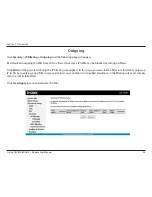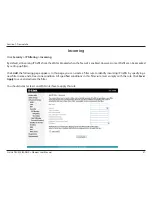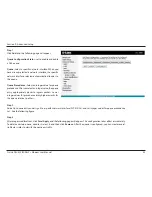
39
D-Link DSL-520B ADSL2+ Modem User Manual
Section 7 - Device Info
NAT
Note:
You must enable the NAT service when you configure the WAN connection at first, the NAT item appears in the Advanced Setup
directory. In the pure bridging mode, there is no NAT service.
Overview - Setting up the NAT Function
The DSL router is equipped with the network address translation (NAT) function. With address mapping, several users in the
local network can access the Internet via one or more public IP addresses. All the local IP addresses are assigned to the public
IP address of the router by default.
One of the characteristics of NAT is that data from the Internet is not allowed into the local network unless it is explicitly
requested by one of the PCs in the network. Most Internet applications can run behind the NAT firewall without any problems.
For example, if you request Internet pages or send and receive e-mails, the request for data from the Internet comes from a PC
in the local network, and so the router allows the data to pass through. The router opens one specific port for the application.
A port in this context is an internal PC address, via which the data is exchanged between the Internet and a client on a PC in
the local network. Communicating via a port is subject to the rules of a particular protocol (TCP or UDP).
If an external application tries to send a call to a PC in the local network, the router blocks it. There is no open port via which
the data could enter the local network. Some applications, such as games on the Internet, require several links (that is, several
ports), so that players can communicate with each other. In addition, these applications must also be permitted to send requests
from other users on the Internet to users in the local network. These applications cannot run if NAT is activated.
Summary of Contents for DSL-520B
Page 1: ......
















































